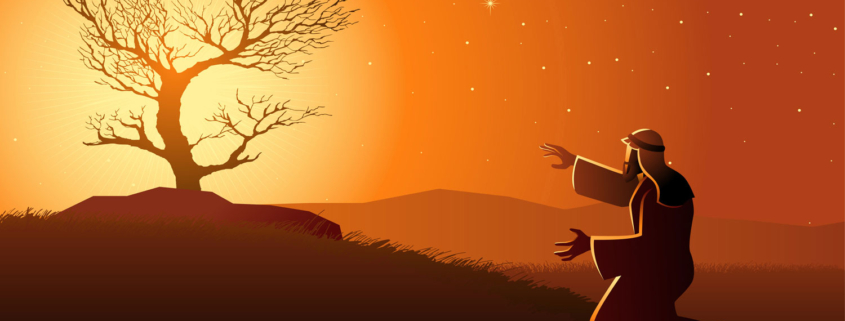God of Deliverance, Pt. 2
What Is the Good News of Yeshua? (Part 9)
While Moses, having fled Egypt, came to dwell in the land to the east, God still heard the cries of Israel, and did not forget His covenant people (Exodus 2:23-24). After forty more years, when Moses was eighty (Acts 7:30), he was out, as usual, shepherding his father-in-law’s flock on what turned out to be the mountain of God (Exodus 3:1). All at once, Adonai suddenly appeared to Moses in a burning fire, engulfing a nearby bramble in flames—though the bush was not consumed. And there for the first time, Adonai spoke to His servant Moses from out of the blazing bush, declaring,
“I am the God of your fathers, God of [Abraham], God of [Isaac], and God of [Jacob]…. I have seen, seeing the affliction of My people… and I have heard their cry… for I have known their pains. And I come down to deliver them out of the hand of the [Egyptians] and to cause them to go up out of the land… to a land flowing with milk and honey…. [S]ay to the sons of [Israel]: ‘I am’ has sent me to you.” (Exodus 3:6-8,14 mjlt)
To assimilated Moses—his whole life spent at a distance from who he truly was—God immediately identified Himself as the covenant-making God of Moses’ Hebrew people Israel. With Moses, and those who were yet enslaved in Egypt, Adonai would rekindle His promise to Abraham, Isaac and Jacob, and make this now innumerable people into a great nation. In pledging to bring them out from under the burdens of the Egyptians and to deliver them from the service of slavery, Adonai had but one, sole intention: to fulfill His covenant and preserve His chosen people—through whom the world would one day be reconciled back to Him.
God then told Moses to go down to Egypt to demand the release of His people. But He also said that the king would not comply until he was supernaturally compelled. And so Moses the chosen one (Psalm 106:23)—doubtful and resistant (Exodus 4:1,10)—took up his shepherd’s staff and his family, and set out to deliver a message… and a people.
Moses obeyed God, and when he arrived in Goshen, he declared the word of “I am” to the elders of Israel—doing wondrous signs for them so that they would believe (Exodus 4:30-31). With his people primed to receive their deliverance, Moses went in to Pharoah—to the den of his former life—and announced boldly to the king,
“This is what Adonai, God of [Israel], has said: ‘Send My people out… that they may serve Me in the desert.’” (Exodus 5:1, 7:16, mjlt)
But just as he had been warned by God, Pharaoh did not let the people go. And so the king hardened his heart and, in the face of Moses’ impudence, caused the already abused people of Israel to suffer even further (Exodus 5:7). The hardship of their labor was increased, and they were beaten by their brutal taskmasters (5:14). As their misery and affliction escalated, the people turned and blamed their deliverer (5:21), leaving Moses disillusioned and not a little testy toward God (5:22ff).
Though the grip of hardship and slavery had been tightened for a time, the God of Israel—the God of Deliverance—nevertheless renewed His promise to come and collect His people, and finally fulfill His covenant. Adonai shielded His covenantal people, as He sent Moses to do great signs and wonders, plaguing the Land of Egypt. Finally, He revealed another Door of salvation through which the world would one day be able to be reconciled to Him.
At Moses’ behest, Israel’s young and perfect lambs were slaughtered, and the people painted the entryways of their homes with that innocent blood—blood which would serve as a sign for Adonai to pass over and spare their dwelling places from Egypt’s final plague (Exodus 12:13,21ff). All night long, a great cry rang throughout the land as the subjects of Egypt wailed in anguish while Adonai carried out His terrible judgment—slaughtering all the firstborn of that national, oppressive power (12:29ff). And as the dawn broke, so did Egypt’s king; relenting to the God of Deliverance, he finally let the people of Israel go (12:31).
Did this post bless you?
♥
As foreseen in their forefather Jacob, the people of Israel had endured their first struggle with man, yet prevailed—for the God of Israel had seen their suffering, and not forgotten His covenant. God’s plan to reconcile the world to Him and reestablish the pathway to life was now marked by acts of awesome power, and coated with the sign of innocent blood. The people of Israel—now the countless, covenantal children of Abraham, Isaac and Jacob—had become the bearers of God’s reputation and the example of perseverance in pursuit of God’s promise. By the hand of a deliverer, Israel had been brought down into Egypt for her salvation; and by another deliverer’s hand, she was brought back out. Soon, in the fullness of time, the God of Deliverance would once again send a Deliverer to save Israel… indeed, to save the whole entire world.
My strength and song is [Yah], And He became my salvation. This is my God, and I glorify Him—God of my father, and I exalt Him. (Exodus 15:2, mjlt)







Leave a Reply
Want to join the discussion?Feel free to contribute!